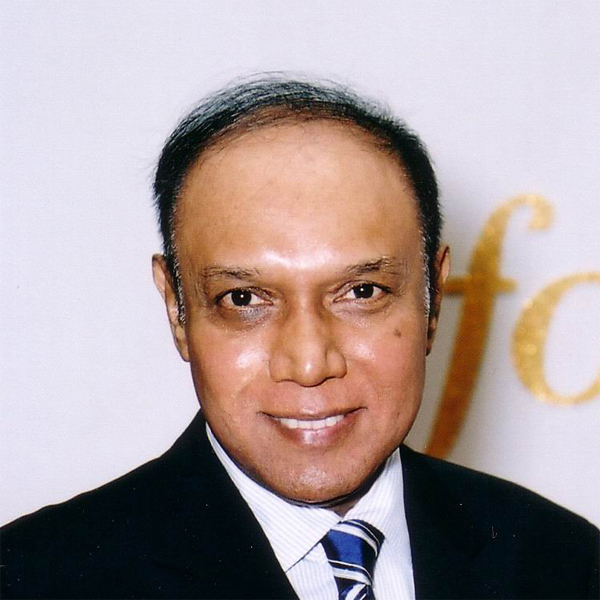Professor Ariff Bongso
Ariff Bongso obtained a Doctor of Veterinary Medicine degree from the Univesity of Sri Lanka in 1970 and then an MSc in 1973 and a PhD in 1976 with distinction merit rating from the Department of Biomedical Sciences of the University of Guelph, Ontario, Canada. He earned a Doctor of Science (DSc) from the National University of Singapore (NUS) in 1995 and was awarded the Fellowship (ad eundem) of the Royal College of Obstetricians and Gynaecologists (FRCOG) from the United Kingdom in 2003. In 2004, he was awarded the Fellowship of the Sri Lanka College of Obstetricians and Gynaecologists (FSLC0G) and later in 2005 was conferred an Honorary DSc from the University of Sri Lanka.
While at the National University of Singapore he held a Special Professorship at the School of Human Development, University of Nottingham, UK between 1998-2000 and was a Visiting Professor to the Clinical Embryology postgraduate program at the Institute of Human Reproduction and Andrology, Monash University, Australia. For his outstanding contributions to research in In Vitro Fertilization and Stem Cell Biology he was awarded the National Science award (Singapore) in 1988, the NUS Outstanding University Researcher award in 1997, National Science award (Singapore) again in 2002, the Asian Innovation award (Gold) from the Far East Economic Review in 2002, the Excellence for Singapore award in 2003 and the ASEAN outstanding scientist award in 2005. In 2018, he was made a fellow of the Singapore National Academy of Sciences for his pioneering work in human stem cell research and continued innovation and contribution to stem cell biology and its biomedical applications.
He holds several patents and over 500 research publications in internationally refereed journals, conference papers and chapters in books. He was one of the founder scientists of Embryonic Stem Cell International (ESI), a Singapore registered Biotechnology Company. He is Research Professor and leads the Stem Cell research program in the Department of Obstetrics and Gynaecology of the Yong Loo Lin School of Medicine at the National University of Singapore.
Publications
- Ng, S. C., Bongso, A., Ratnam, S. S., Sathananthan, H., Chan, C. L., Wong, P. C., Hagglund, L., Anandakumar, C., Wong, Y. C., & Goh, V. H. (1988). Pregnancy after transfer of sperm under zona. Lancet (London, England), 2(8614), 790. https://doi.org/10.1016/s0140-6736(88)92433-6
- Bongso, A., Ng, S. C., Fong, C. Y., Anandakumar, C., Marshall, B., Edirisinghe, R., & Ratnam, S. (1992). Improved pregnancy rate after transfer of embryos grown in human fallopian tubal cell coculture. Fertility and sterility, 58(3), 569–574. https://doi.org/10.1016/s0015-0282(16)55265-0
- Bongso, A., Fong, C. Y., Ng, S. C., & Ratnam, S. (1994). Isolation and culture of inner cell mass cells from human blastocysts. Human reproduction (Oxford, England), 9(11), 2110–2117. https://doi.org/10.1093/oxfordjournals.humrep.a138401
- Reubinoff, B. E., Pera, M. F., Fong, C. Y., Trounson, A., & Bongso, A. (2000). Embryonic stem cell lines from human blastocysts: somatic differentiation in vitro. Nature biotechnology, 18(4), 399–404. https://doi.org/10.1038/74447
- Richards, M., Fong, C. Y., Chan, W. K., Wong, P. C., & Bongso, A. (2002). Human feeders support prolonged undifferentiated growth of human inner cell masses and embryonic stem cells. Nature biotechnology, 20(9), 933–936. https://doi.org/10.1038/nbt726
- Subramanian, A., Fong, C. Y., Biswas, A., & Bongso, A. (2015). Comparative Characterization of Cells from the Various Compartments of the Human Umbilical Cord Shows that the Wharton's Jelly Compartment Provides the Best Source of Clinically Utilizable Mesenchymal Stem Cells. PloS one, 10(6), e0127992. https://doi.org/10.1371/journal.pone.0127992

